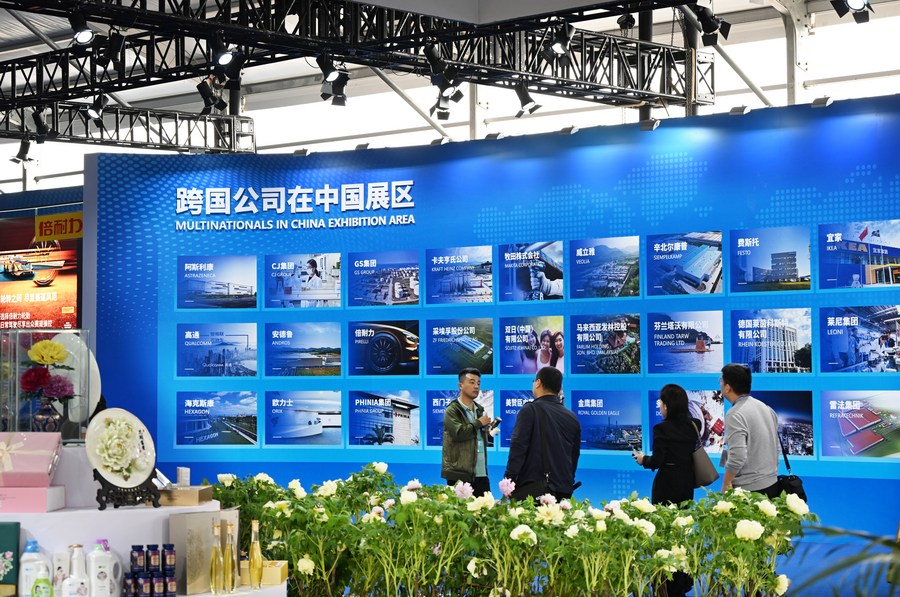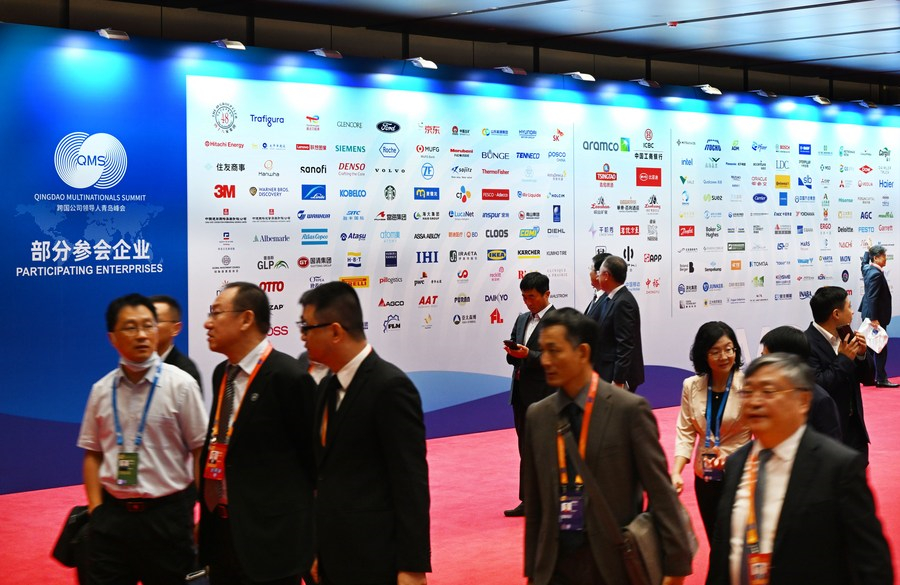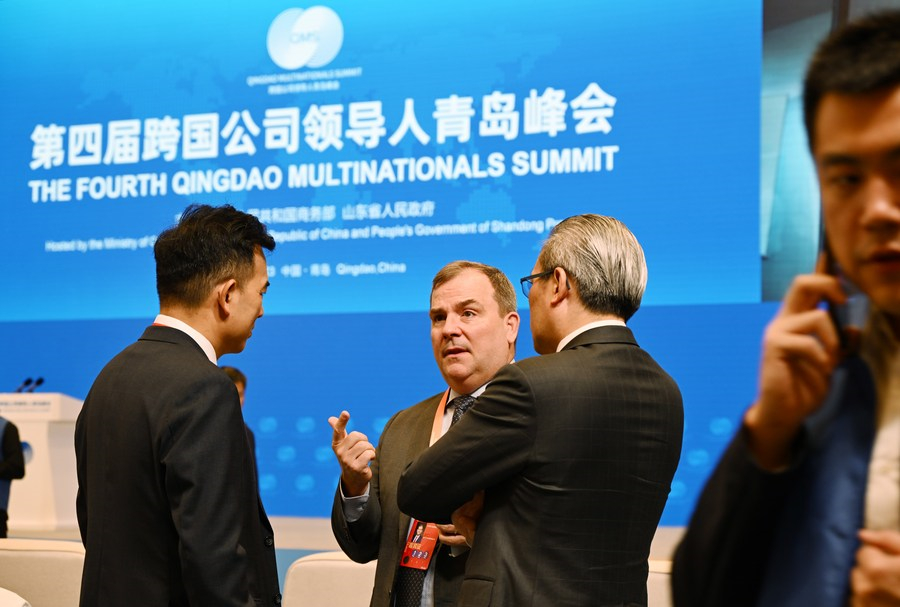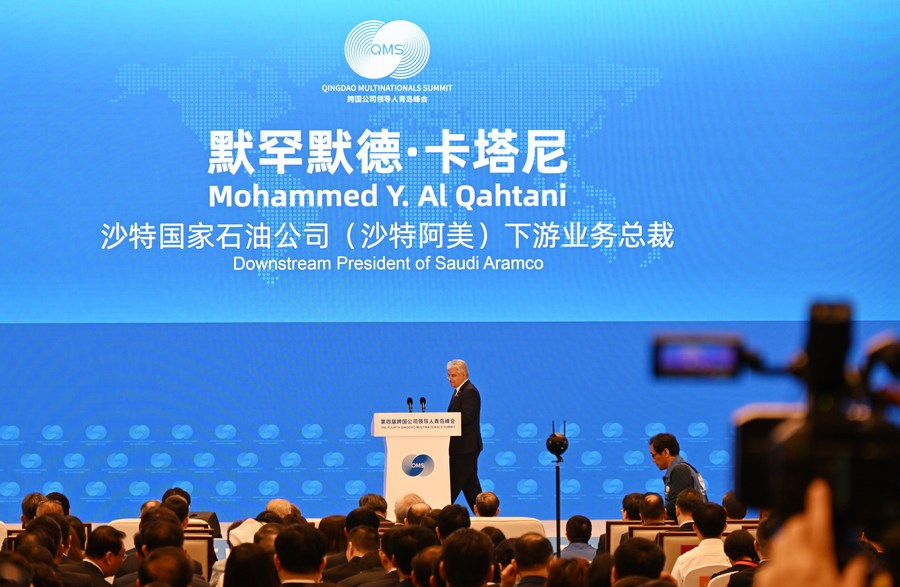China still an investment hot spot for multinationals
* China remains a hot spot for global investment, noted representatives of multinationals and industry insiders at the fourth Qingdao Multinationals Summit.
* The enormous market potential, mushrooming emerging industries, abundant industrial clusters, and high-quality talent pool have endowed China with strong economic resilience.
* Amid the rising protectionism and anti-globalization wave, China's commitment to further opening up has sent out a positive signal for global investors.
JINAN -- China remains a hot spot for global investment, where the market offers sustained fresh opportunities and growth points, noted representatives of multinationals and industry insiders at the fourth Qingdao Multinationals Summit held in the coastal city of Qingdao, east China's Shandong Province.
Themed "Multinationals and China," a major objective of this year's summit is to promote economic exchanges between Chinese and international enterprises and encourage multinationals to invest in advanced manufacturing, modern service, high-tech, and green industries in China.

Participants visit the "Multinationals and China" thematic exhibition, a complementary event to the fourth Qingdao Multinationals Summit, in Qingdao, east China's Shandong Province, Oct. 10, 2023. [Xinhua/Li Ziheng]
Covering topics including greater efforts to utilize foreign investment, new trends in industrial investment layout, and international cooperation in the digital economy, the three-day summit, which closed on Thursday, has drawn top-level managers from 416 multinationals.
INVESTMENT PARADISE
The enormous market potential, mushrooming emerging industries, abundant industrial clusters, and high-quality talent pool have endowed China with strong economic resilience, which injects persistent confidence for foreign companies to keep investing in China, noted participants at the summit.
"China is one of the largest industrial and consumer markets around the world. An enterprise of a certain size cannot further expand leaving the Chinese market," said Sean Yan, head of marketing in northeast China of Konecranes, a Finnish company specializing in the manufacture and service of crane and lifting equipment.
Konecranes has recently decided to put its North-East Asia headquarters in Shanghai. "All that we are making further progress in, such as organizational structure, personnel, products, and research and development, are to better meet the needs of the Chinese market," said Yan.
In line with the ultra-large market, China's manufacturing industry is quite complete, and its position in the global industrial and supply chains is constantly improving, bringing new growth points to the development of multinational enterprises.
China is far more than a big manufacturer and consumer; it is also a major innovator. Its pillar industries are gradually shifting from labor-intensive to technology-intensive, such as automobiles, materials, and electronic components, according to Tetsuro Homma, representative director and executive vice president of Panasonic Holdings Corporation.

Participants walk past a bulletin board displaying names of participating enterprises during the fourth Qingdao Multinationals Summit in Qingdao, east China's Shandong Province, Oct. 11, 2023. [Xinhua/Li Ziheng]
Having entered the Chinese market for 45 years, Panasonic, the Japan-based multinational, now has about 50,000 employees in China, and the sales volume in the Chinese market takes up a 27-percent share of its global total. The company boasts an R&D fleet of almost 10,000 researchers in China, and its investment keeps mounting.
SHARED OPPORTUNITIES
This is the fourth time for the German industrial automation company Festo to attend the Qingdao summit. Li Feng, COO of Festo BR GCN & general manager of Festo Production Ltd., noted that China's determination to advance higher-level opening up and share development dividends has reaffirmed Festo's further localization drive in the Chinese market.
"During Festo's 30 years in China, the stable and safe business environment has laid the foundation for our development. The strong support of relevant policies and the intellectual property protection for multinationals is also an important factor in multinational companies' global layout," Li added.
During the summit, an event incorporating a series of promotions and briefings structured around the themes of attracting foreign investment and supporting the long-term stable development of foreign-funded firms was also launched.

Participants talk during the fourth Qingdao Multinationals Summit in Qingdao, east China's Shandong Province, Oct. 11, 2023. [Xinhua/Li Ziheng]
"China's investment agencies are pragmatic and service-oriented. They are able to actively respond to various challenges and are ready to help enterprises solve any problems. This adds to many multinationals' willingness to tap deeper into the Chinese market," said Andy Liew, general manager of nVent Enclosure APAC, a leading designer and manufacturer of electrical enclosures.
LONG-TERM CONFIDENCE
The World Investment Report 2023, published by the United Nations Conference on Trade and Development, shows that in the past two years, although global cross-border direct investment has shown signs of recovery, the growth momentum is clearly insufficient and still faces a lot of uncertainty.
Amid the rising protectionism and anti-globalization wave, China's commitment to further opening up has sent out a positive signal for global investors.
A report, "Multinationals in China: Certainty in the Uncertain Global Investment Environment," published at the summit by the Ministry of Commerce, shows that measures to optimize the foreign investment environment China implemented in 2022 have proved effective. From 2020 to 2022, China's FDI inflow grew at an average annual rate of 12.5 percent, and the country saw over 40,000 foreign-funded enterprises newly established each year.
"It's impressive to see how much the world appreciates China's development," said John R Adler, CEO of ZAP Surgical Systems, Inc., a leading innovator in the field of surgical robotics. "We all feel we need to be here because this is a great opportunity for us."

Downstream President of Saudi Aramco Mohammed Y. Al Qahtani speaks during the opening ceremony of fourth Qingdao Multinationals Summit in Qingdao, east China's Shandong Province, Oct. 11, 2023. [Xinhua/Li Ziheng]
"We believe the mutual respect, partnership, and collaboration between our two nations have never been stronger," noted Mohammed Y. Al Qahtani, downstream president of Saudi Aramco, a world-leading energy company. He added that the company inked contracts worth up to 8 billion U.S. dollars with its Chinese partners this year to expand its presence in the world's second-largest economy.
"I believe we are only in the early chapters of a much bigger story. Because while the present day is promising, the future is even brighter," said Qahtani.
Video reporters: Feng Yuanyuan and Li Xiaobo; video editors: Yang Zhixiang, Li Qin, Luo Hui, Liu Ruoshi and Ma Ruxuan
























